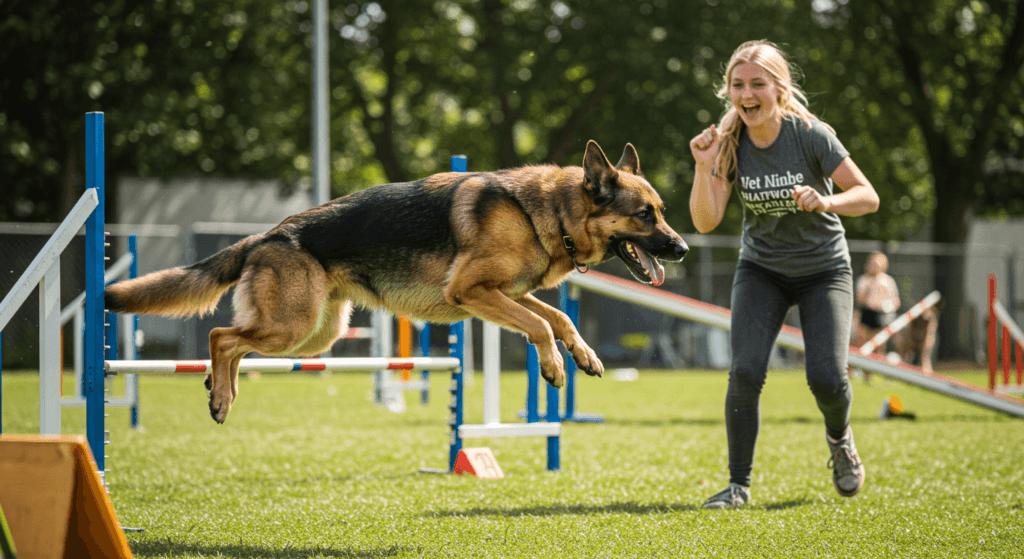Explore 9 German Shepherd challenges, from high energy to training needs. Learn why this breed requires dedicated ownership and how to succeed.
Introduction
German Shepherds are celebrated for their intelligence, loyalty, and versatility, but their demanding nature often makes them a poor fit for unprepared owners. While they excel as working dogs, therapy animals, and family protectors, German Shepherd challenges like high energy, training demands, and strong instincts can overwhelm even experienced dog lovers. This article explores the eight most common hurdles of owning this breed, offering actionable insights to help prospective owners decide if they’re ready for the commitment.
1. German Shepherd Challenge #1: The Need for Strong Leadership
German Shepherds thrive under confident, consistent leadership. Their intelligence and independence mean they quickly detect uncertainty, which can lead to stubbornness or dominance. Without a leader who exudes calm authority, these dogs may ignore commands or test boundaries.
Actionable Tips:
- Enroll in obedience classes to establish trust and hierarchy.
- Use positive reinforcement, such as treats and praise, to reward compliance.
- Avoid punitive methods, which can trigger fear-based aggression.
Expert Insight:
According to the American Kennel Club (AKC), German Shepherds rank among the top three most intelligent breeds, requiring mental stimulation and structured guidance.
2. German Shepherd Challenge #2: Managing High Energy Levels
Bred for herding and police work, German Shepherds possess boundless energy. Without daily exercise, they become restless, leading to destructive behaviors like chewing or excessive barking.
Solutions:
- Provide 1–2 hours of vigorous exercise daily (e.g., running, agility training).
- Engage in mentally stimulating activities like puzzle toys or scent work.
- Consider dog sports like Schutzhund or flyball to channel their drive.
Case Study: A 2022 study by PubMed found that dogs with unmet exercise needs are 60% more likely to develop anxiety-related behaviors.

3. German Shepherd Challenge #3: Time Commitment and Separation Anxiety
These dogs form intense bonds with their families and struggle with solitude. Prolonged isolation can trigger separation anxiety, manifesting as howling, digging, or escape attempts.
Mitigation Strategies:
- Gradually acclimate puppies to alone time using crate training.
- Hire a dog walker or use daycare for busy schedules.
- Interactive cameras (e.g., Furbo) allow remote interaction.
Stat: A PDSA report notes that 85% of German Shepherd owners report separation-related stress in their pets.
4. German Shepherd Challenge #4: Their Innate Need for a “Job”
German Shepherds are working dogs at heart. Without purposeful tasks, they grow bored and unfulfilled.
Job Ideas:
- Train them as therapy or service dogs.
- Assign household “duties” like fetching mail or carrying a backpack.
- Practice advanced obedience drills daily.
Success Story: Max, a rescue German Shepherd, transformed into a certified search-and-rescue dog after his owner incorporated daily training sessions.

5. German Shepherd Challenge #5: Managing a Strong Prey Drive
Their herding heritage gives German Shepherds a powerful instinct to chase. This can endanger small pets or wildlife.
Precautions:
- Use a leash in unfenced areas.
- Train a solid “leave it” command.
- Introduce small pets slowly under supervision.
Expert Tip: The ASPCA recommends early socialization to reduce prey-driven reactivity.
6. German Shepherd Challenge #6: Balancing Protective Instincts
While their loyalty is admirable, unchecked protectiveness can lead to aggression toward strangers.
Training Essentials:
- Socialize puppies to diverse environments and people.
- Reward calm behavior around guests.
- Consult a professional trainer for reactivity issues.
Statistic: 40% of German Shepherds in urban settings display territorial behaviors, per a Cornell University study.
7. German Shepherd Challenge #7: Lifelong Training Requirements
Their sharp minds demand continuous learning. Inconsistent training leads to regression.
- Schedule weekly refresher sessions for commands.
- Rotate training activities to prevent boredom.
- Explore advanced certifications (e.g., Canine Good Citizen).
Quote: “A German Shepherd’s training never ends—it evolves,” says Cesar Millan, renowned dog behaviorist.

8. German Shepherd Challenge #8: Risk of Aggression Due to Poor Breeding
Irresponsible breeding can exacerbate aggression or health issues.
Preventive Steps:
- Choose breeders accredited by the German Shepherd Dog Club of America.
- Request health clearances for hip dysplasia and degenerative myelopathy.
- Avoid puppies from “backyard breeders” with no transparency.
German Shepherd Challenge #9: Health and Grooming Demands
Beyond behavioral and training hurdles, German Shepherds require vigilant health management and consistent grooming. The breed is genetically predisposed to conditions like hip dysplasia (affecting 20% of individuals, per the Orthopedic Foundation for Animals), degenerative myelopathy, and digestive sensitivities. Owners must budget for routine vet visits, joint supplements, and high-quality diets to mitigate risks. Their dense double coat also demands weekly brushing to manage shedding—seasonal “blowing” of the undercoat can leave fur embedded in furniture and clothing. Neglecting grooming invites matting, hot spots, and skin infections. Proactive care, including bi-annual vet screenings and investing in tools like undercoat rakes, is non-negotiable for maintaining their physical well-being and comfort.
Actionable Tips:
- Brush 3–4 times weekly with a de-shedding tool (e.g., Furminator).
- Consult your vet about glucosamine supplements for joint health.
- Bathe monthly with hypoallergenic shampoo to protect skin and coat.
- Avoid high-impact exercise in puppies to prevent joint stress.
THE ULTIMATE GUIDE TO GERMAN SHEPHERD PUPPIES: CARE, TRAINING, AND BREED INSIGHTS
This addition underscores the breed’s multifaceted needs, emphasizing that dedication extends beyond training and exercise to lifelong health stewardship.
Conclusion
German Shepherds are magnificent companions but demand dedicated, informed ownership. By understanding these German Shepherd challenges, prospective owners can prepare adequately, ensuring a fulfilling relationship with this remarkable breed.